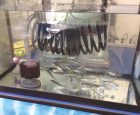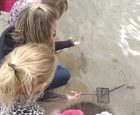
News & Views
Ontario local schools get mini-hatcheries
Seven Sarnia, Ontario area schools in Canada are getting a chance to learn about the life-cycles of fish and hatchery production through mini-hatcheries.
July 12, 2018 By Matt Jones
 Chinook salmon grow in a mini-hatchery at a Sarnia-area classroom. Seven Sarnia
Chinook salmon grow in a mini-hatchery at a Sarnia-area classroom. Seven SarniaInstalled and administered by the Bluewater Anglers Club (BAC), the mini-hatcheries are the result of a collaboration between the Lake Huron Fishing Club and the Bruce Power company which is providing funding for the project. BAC Hatchery Manager Jake Van Rooyen says that the educational effort has been a great success with schools from kindergarten through high school.
“We started doing it in our schools using chinook salmon,” says Van Rooyen. “It works really well with the schools because we collect eggs around the middle of October, so they’re ready to eye up about a month after that. We usually put about 30 eggs in the aquarium at the schools. They develop them until spring, and then stock them with the fish that we stock.”
Each mini-hatchery is a 20 gallon aquarium, which includes systems for refrigeration, filtration and aeration. The effort started with the Lake Huron Fishing Club in Port Elgin, Ontario which has provided equipment to the BAC. A grant from Bruce Power covers the costs, which run $1,200-$1,500 per unit.
Related: High school students learn the ropes in innovative aquaculture program
“It takes a fair bit of time making sure we have mentors for all the schools to look after them,” says Van Rooyen. “We’ve got four guys who go throughout the schools once a week to make sure things are going okay. And, if they’re not, the teachers can call them to get a bit of assistance. As they get experience, it takes less of our time.”
Van Rooyen says it’s fascinating to watch the children take possession of the fish as they move through the process. These are their fish, he says, not someone else’s fish they are looking after.
The BAC hopes that the mini-hatcheries will get students thinking more about nature and possibly spark an interest in fishing and hatchery work.
“If the opportunity is available to get more schools involved in different areas, it’s a wonderful program to show kids what goes on,” says Van Rooyen.
“When they see a fish pop out of the eggs and start eating, growing, developing colouring and then get the opportunity to put them into the wild – the big thing for us is the joy we see in the expressions on some of these children’s faces.”
Print this page







